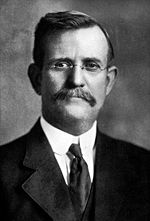1865
1865 was 6 years before the founding of the City of Birmingham, 46 years after Alabama became a state, and 4 years after Alabama joined the Confederacy.
Events
- April 4: The University of Alabama and its library were burned by Union troops under the command of Thomas M. Johnston.
- April 9: The Civil War ended with General Lee's surrender at Appomattox.
- April 10: Alabama was made a military district of the United States.
- June 21: Lewis E. Parsons was appointed provisional Governor of Alabama by United States occupation forces.
- December 13: Robert M. Patton was inaugurated as Alabama's newly elected governor.
- Canaan Missionary Baptist Church was organized.
- The Jefferson County Medical Society was organized by Joseph Riley Smith.
- Talladega College was founded as a one-room school for African Americans.
- Peyton King bought the 1,640-acre homestead of Abner Killough in the area that later became Avondale.
Battles
- Spring: The Battle of Avondale, actually a minor skirmish, took place.
- March 22: Union Brigadier General James H. Wilson began his raid into Alabama by separating his forces in three separate columns to mask his intentions.
- March 26: Wilson's Raid continued with a skirmish at the Black Warrior River.
- March 27: Wilson's columns rejoined at Jasper, burning Jasper Methodist Church, the Walker County Courthouse and the Jasper Masonic Lodge.
- March 28: Wilson and McCook used the William Mudd residence in Elyton as temporary headquarters while burning the town.
- March 28: Union troops destroyed the Oxmoor and Irondale Furnaces.
- March: A division of Wilson's army camped at the Williamson Hawkins plantation.
- March: Wilson's troops also destroyed the Conners Steel rolling mill in Helena and the Confederate Storehouse in Trussville.
- March 30: Wilson's troops destroyed the Central Iron Works in along Buck Creek.
- March 31: Confederate forces were routed by the larger, better-armed Union force at Montevallo, which destroyed the Shelby Furnace.
- March 31: A detachment from Wilson's forces attacked and burned the Tannehill Ironworks.
- March 31: A detachment from Wilson's forces burned the Brierfield Ironworks.
- April: A detachment from Wilson's forces burned the campus of the University of Alabama.
- April: Union forces used Washington Hall as barracks before burning it.
- April: Wilson's troops destroyed Brighthope iron furnace and the Little Cahaba Iron Works.
- April 2: The Confederates lost the Battle of Selma.
- April 12: Wilson's forces occupied Montgomery before moving on to Georgia.
- April 16: Wilson's forces participated in battles at Fort Tyler (near West Point, Georgia) and Girard (near Columbus), the last military engagements between Confederate and U. S. forces fought on Alabama soil.
Individuals
- February: Frank O'Brien was released as a prisoner of war by the North.
- April 9: Confederate Captain William Ward was captured by Union forces.
- July 29: William F. Hamby succeeded Abner Killough as Jefferson County Sheriff.
- November: Jabez Curry became president of Howard College.
- James H. Duran succeeded James Walton as Shelby County Sheriff. Duran was then succeeded by Charles B. Elliott.
- Mortimer Jordan Jr moved to Cincinnati, Ohio to attend the Miami Medical College.
- A. B. Loveman emigrated to the United States.
- Alburto Martin was re-elected by the general assembly as solicitor for the Jefferson County judicial circuit.
- George Raps' parents moved his family to Murfreesboro, Tennessee.
- N. F. Thompson was hired as deputy clerk for Bedford County, Tennessee.
- Samuel Ullman moved to Natchez.
- Charles Whelan was paroled from active duty.
Births
- January 20: John J. Connolly, trainmaster
- February 17: Frank Nelson Jr, industrialist and real estate developer
- April: D. M. "Mac" Drennen, president of Drennen Bros. mercantile
- April 24: Lemuel Dawson, Baptist minister
- May 8: W. G. Lunsford, plumber and investor
- May 26: George Bodeker, Birmingham Police Chief
- August 23: Horace Waters, member of the Birmingham Board of Education
- September 8: Thomas Benners, founder of T. H. Benners & Co..
- December 4: John L. Parker, acting mayor of Birmingham
- December 5: Dyer Talley, surgeon
- December 10: William Wier, Birmingham Police Chief
- Lawrence Buck, architect
- Roderick MacKenzie, artist
- Harvey Woodward, real estate heir
Marriages
- October: Willis Milner married Gustrine C. Key.
- October 11: Frank O'Brien married Indiana "Dannie" McBride.
Deaths
- August 29: Lemuel McMillion, state representative
Works
Buildings
Paintings
- "A Dream of Italy" by Robert Scott Duncanson
- "Looking Down Yosemite Valley, California" by Albert Bierstadt
Context
In 1865, the Confederate States surrendered, ending the Civil War. President Abraham Lincoln was assassinated by John Wilkes Booth; Andrew Johnson became President. The Christian Mission, later renamed the Salvation Army, was founded in London. The U.S. Secret Service was founded. Léopold II became King of the Belgians. The Thirteenth Amendment, abolishing slavery, was declared ratified. The original Ku Klux Klan was founded. Gregor Mendel formulated his theories of Mendelian inheritance.
Books published in 1865 included Alice's Adventures in Wonderland by Lewis Carroll and From the Earth to the Moon by Jules Verne.
Notable births in 1865 included YMCA leader John Mott, writer Robert W. Chambers, King George V of the United Kingdom, composer Carl Nielsen, writer William Butler Yeats, composer Paul Dukas, President Warren G. Harding, and writer Rudyard Kipling. Notable deaths included cook Isabella Beeton, President Abraham Lincoln, assassin John Wilkes Booth, shipping magnate Samuel Cunard, and King Leopold I of Belgium.
| 1860s |
| << 1860 1861 1862 1863 1864 1865 1866 1867 1868 1869 >> |
| Births - Deaths - Establishments - Events - Works |



